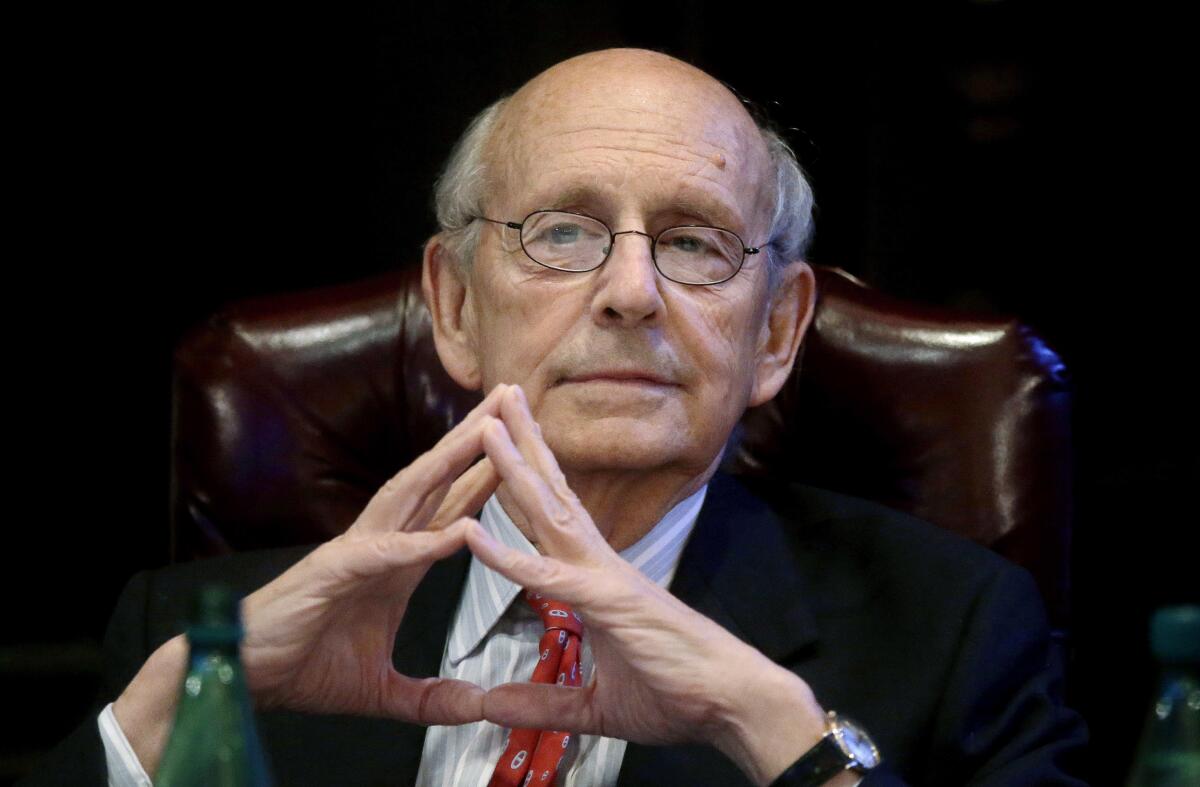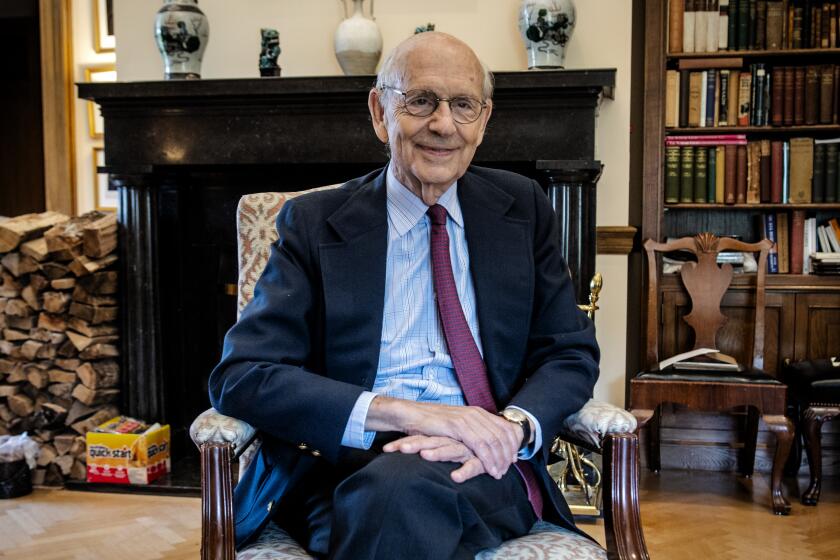Column: Breyer’s retirement gives Democrats a chance for a new justice — and a political reboot

- Share via
Better late than never came the news on Wednesday that Justice Stephen G. Breyer will retire after the Supreme Court’s term ends in June, and before the midterm election that could restore Mitch McConnell and his fellow Republicans to power in the Senate. Better for President Biden and Democrats, surely, but also for the court and for the nation.
It’s still too early to breathe more easily, however. While confirmation of a Biden nominee is likely — even Sen. Lindsey Graham (R-Trump) says so — we’ve learned not to underestimate Machiavelli, er, McConnell, especially when it comes to packing the court.
If not for McConnell, Donald Trump would have filled one seat on the Supreme Court, not three. The Kentucky Republican stole the other two, which rightfully were Democratic presidents’ to fill. McConnell proudly counts that court packing as his legacy; it’s a legacy alright, justifiably featured in the bestseller “How Democracies Die.”
Opinion Columnist
Jackie Calmes
Jackie Calmes brings a critical eye to the national political scene. She has decades of experience covering the White House and Congress.
Instead of a Supreme Court with six Republican appointees and three named by Democratic presidents — the most conservative court since the 1930s — by rights we should have a 5-4 bench with a liberal-to-moderate majority of Democratic-appointed justices. And if we did, we wouldn’t now be anticipating the end of abortion rights, college affirmative action and modest gun controls, among other rulings at odds with mainstream opinion.
Yet it’s thanks to McConnell that Biden’s nominee won’t face a filibuster requiring 60 votes for confirmation. He did away with the filibuster in early 2017 for Trump’s Supreme Court nominees, knowing they wouldn’t have been confirmed otherwise. “No Republican president could get the kind of nominee we’d want” — that is, far-right — “with 60 votes,” McConnell acknowledged at a 2018 gala of the conservative Federalist Society.
Justice Stephen G. Breyer will retire, clearing the way for President Biden to make his first appointment to the Supreme Court.
The court’s (im)balance wouldn’t be changed by Biden’s replacement for Breyer. The new justice would be an even swap, one liberal for another.
Yet the court itself would be changed, assuming Biden keeps his campaign promise to name the first Black woman to the court. The most likely nominee is Ketanji Brown Jackson, a former law clerk to Breyer and a federal judge who was confirmed last year to the D.C. Circuit Court of Appeals, second only to the Supreme Court in prestige and a steppingstone for current Justices John G. Roberts Jr., Clarence Thomas and Brett M. Kavanaugh. Also a contender is Leondra Kruger, a justice on the California Supreme Court.
The 83-year-old Breyer, who’s lately been a defender of the court’s apolitical reputation even against the contrary evidence of recent years, has been a fine justice for 27 years. He should have announced his retirement last year, to allow Biden to get a younger justice confirmed as soon as possible, while Democrats controlled the Senate. Perhaps he got his back up, understandably, amid progressive activists’ heavy-handed pressure for him to leave.
But he’d witnessed the consequences of Justice Ruth Bader Ginsburg’s refusal to retire while President Obama was in office and able to name her successor; she was replaced instead by a justice, Amy Coney Barrett, who is Ginsburg’s opposite — and Breyer’s — in so many ways.
When Ginsburg died just before the 2020 election, McConnell — who blocked Obama’s nomination of Merrick Garland for most of a year after Antonin Scalia died in February 2016 — rammed through Trump’s nomination of Barrett in under five weeks.
In blocking the Garland nomination, McConnell said he merely wanted to “give the people a voice in filling this vacancy” in an election year. Yet when Barrett was shunted through at the end of October 2020, millions of Americans had already cast ballots in an election that would oust Trump and cost the Republicans the Senate majority that confirmed her. So much for respecting the people’s voice.
Get the latest from Jackie Calmes
Commentary on politics and more from award-winning opinion columnist.
You may occasionally receive promotional content from the Los Angeles Times.
When Breyer didn’t announce his retirement last year, and McConnell said in a radio interview that he’d block a Biden nominee if Senate Republicans regained a majority, plenty of Democrats got panicky. Even before the midterms, the loss of a single Democrat, for any reason, could give Republicans a Senate majority; Democrats had braced for the worst just after Biden’s inaugural, when Sen. Patrick J. Leahy of Vermont was hospitalized.
Leahy turned out to be fine, but Democrats have been holding their breaths ever since.
Breyer’s decision provides relief to Biden and his party for another reason as well. It comes just after Democrats’ failure to pass voting rights and social safety-net bills, which left the party divided and demoralized. The chance to confirm a new justice who’ll serve for years, and a path-breaking one, provides a welcome reboot around a unifying cause, and a way to motivate Black voters who are among the party’s most disillusioned.
The confirmation process also will underscore for Democratic voters that the party’s fragile Senate majority, frustrating as it is for passing legislation, is crucial for confirming federal judges. Biden got 42 judges confirmed in his first year, more than any president since John F. Kennedy.
The Democrats might still have a chance to preserve their Senate majority in the midterms, given a lineup of races that slightly disfavors Republicans. (It’s a different story for the all-but-doomed Democrats in the House.)
Holding the Senate will take a lot of work organizing and rallying voters. Confirming a nominee to take Breyer’s seat provides an opportunity to regroup and get to it.
More to Read
Get the latest from Jackie Calmes
Commentary on politics and more from award-winning opinion columnist.
You may occasionally receive promotional content from the Los Angeles Times.













